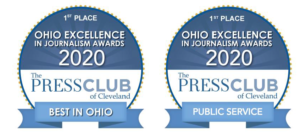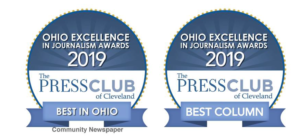Earlier this week my husband and I attended Reaching Musical Heights, a concert that happens in our school district every four years. It is sponsored by Reaching Heights, the nonprofit organization that promotes equity and opportunity to learn across the Cleveland Heights-University Heights school district’s elementary and middle schools and that rents Severance Hall, the gorgeous, art deco home of the Cleveland Orchestra, for these quadrennial concerts to showcase our district’s school music program. This year the concert happened, ironically, during the first-ever week of Ohio’s PARCC (Common Core) standardized test. But the test our students took on Tuesday night at Severance Hall was different.
Musical performance is the definition of authentic learning and assessment, and the recent concert was a test that our students definitely passed (despite that their performance will not affect our schools’ ratings based on state assessments and the PARCC). To use the lingo of the day, musical performance also perfectly exemplifies collaborative learning. Elementary singers stayed on pitch and instrumentalists and singers came together from both of our middle schools in an honors chorus and an honors orchestra to perform together as they will in a year or two when they get to high school. The high school concert band sounded great playing a tricky piece with complicated percussion and lots of brass. A high school a capella choir sang a moving “Shenandoah” with such intricate harmony and sensitive dynamics it made us cry, and then different student conductors led the next two selections. When the high school symphony played a movement from Stravinsky’s The Firebird, a girl with blue hair played perfect bassoon solos. A recent graduate, Geoffrey Golden, returned from Morehouse College to accompany the gospel choir on the piano and to sing a solo. I attended the dress rehearsal for part of the afternoon, and watched while the high school symphony and a huge choir prepared selections by John Rutter and Beethoven—adjusting the dynamics again and again in the huge and unfamiliar concert hall to ensure that the oboe was audible in one section and the orchestra didn’t overwhelm the choir in another. A jazz combo played for a pre-concert reception, men’s barbershoppers sang on stage, a harpist played a Beatles tune in the ticket lobby, and a mass choir with pit orchestra opened with a show tune by Frank Loesser.
Contrast all this with today’s dominant myth about education, described by NY Times columnist Paul Krugman in a column in last Monday’s paper. Krugman describes what can be called “the world is flat” myth, which casts our nation’s economic future amidst a vast competition in a connected techie world. This story alleges that the nation’s economic growth—and hence our future—is being imperiled by our public education system, which is mediocre at best. Krugman explains: “The education-centric story of our problems runs like this: We live in a period of unprecedented technological change, and too many American workers lack the skills to cope with that change. This ‘skills gap’ is holding back growth, because businesses can’t find the workers they need. It also feeds inequality, as wages soar for workers with the right skills but stagnate or decline for the less educated. So what we need is more and better education.” Krugman, a Nobel prize-winning economist as well as a NY Times columnist, rejects this myth: “There’s no evidence that a skills gap is holding back employment. After all, if businesses were desperate for workers with certain skills, they would presumably be offering premium wages to attract such workers… Actually, the inflation-adjusted earnings of highly educated Americans have gone nowhere since the late 1990s.”
Krugman tells us that corporate profits continue to soar, but something besides education is preventing widespread well being and feeding the rapid growth of inequality: “As for wages and salaries, never mind college degrees—all the big gains are going to a tiny group of individuals holding strategic positions in corporate suites or astride the crossroads of finance. Rising inequality isn’t about who has the knowledge; it’s about who has the power.” Krugman suggests some solutions for improving the economy: “Levy higher taxes on corporations and the wealthy, and invest the proceeds in programs that help working families. We could raise the minimum wage and make it easier for workers to organize.”
Interestingly, last Monday the NT Times printed a sort of double whammy with an op ed piece on the same theme as Krugman’s column, an op ed from Larry Mishel, president of the Economic Policy Institute. Mishel rejects tax cuts as any kind of solution to the problem of inequality: “What has hurt workers’ paychecks is not what the government takes out, but what their employers no longer put in—a dynamic that tax cuts cannot eliminate… Taxation does not explain why middle-income families are having a harder time making ends meet, even as they increase their education and become ever more productive.” In fact tax cuts are counter-productive because they collapse society’s capacity to respond to rising inequality. Mishel’s prescription is similar to Krugman’s: raise the minimum wage; protect workers’ right to unionize and bargain collectively, and keep people on salary instead of turning work over to so-called independent contractors. “Because wage stagnation was caused by policy, it can be reversed by policy, too.”
Narrowing inequality, as Krugman and Mishel tell us, cannot be accomplished merely by improving education, It will instead require policies that support the people who do the work, not merely the titans who manipulate high finance. But educating our children remains absolutely central to who we are as a people. Think about that concert earlier this week. What made the evening of music especially important is that the concert presented a public school music program in a school district where the children are not affluent. Sixty percent of the students in our school district qualify for free lunch; they are not the children of the powerful financiers Paul Krugman describes. Enriching their skills to make and enjoy music and their opportunity to collaborate in the creation of something beautiful is our gift to them from the public. Public schools can’t get rid of inequality, but they are one way that our society can expand opportunity for our children.



Leave a Reply